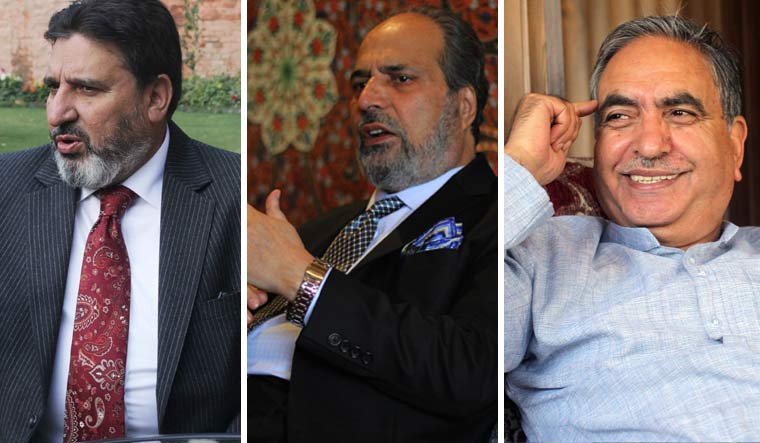WITH A GROUP of politicians in Kashmir appearing to turn a blind eye to the abrogation of Article 370, the political vacuum in Jammu and Kashmir could soon be filled. The vacuum was formed after top political leaders were placed under house arrest ahead of the abrogation of Article 370 and the splitting of the state into two Union Territories. The leaders have been in detention since August 5, 2019.
Most members of the new group belong to the J&K Peoples Democratic Party (PDP) and are led by former minister Altaf Bukhari. The first signs of Bukhari moving away from the PDP’s stand against the abrogation of Article 370 appeared in October last year. Bukhari, PDP patron and former deputy chief minister of J&K Muzaffar Hussain Baig, the Congress’s Usman Majeed and J&K Democratic Party chief Ghulam Hassan Mir had attended a lunch hosted by National Security Adviser Ajit Doval to honour the members of European Parliament (MEPs) on the eve of their two-day tour of Kashmir.
On January 8, Bukhari led a delegation of eight PDP legislators and Mir to J&K’s Lieutenant Governor Girish Chandra Murmu. They presented a 15-point memorandum demanding the restoration of statehood to J&K, release of all political prisoners and detainees, protection of jobs and property for residents of J&K on the lines of Article 371, and withdrawal of charges against those detained after the abrogation of Article 370.
“Our meeting with the lieutenant governor was prompted by an advertisement by the J&K High Court seeking applications from all over India to fill some vacancies,” Bukhari told THE WEEK. Though the High Court’s advertisement was later withdrawn, he said other government departments had also readied similar advertisements.
“We thought politics can wait, but if we do not react now, it will harm the interest of the people of J&K,” he said. “The memorandum we submitted to the governor has been reported in the media. There is nothing secret about our meeting.” He added that the matter of Article 370 being revoked is in the Supreme Court, and accepted that the court’s decision is binding on all. “I have no hidden agenda,” he said.
Bukhari said the group of politicians he is leading is likely to become a new party in a few months. According to sources, Bukhari has not been able to rope in Baig. “Baig sahib wants to be the chief ministerial candidate in the new political formation,” said a source. “Bukhari sahib told him that he is welcome to join them, but electing the chief ministerial candidate should be left to the members of the group.”
Sources close to Baig told THE WEEK that he wants J&K leaders to press for the restoration of statehood and an Article 371-like status. He also wants politicians to develop a consensus to contest elections, otherwise the Centre would not pay heed to their demands.
On January 9, Baig took a dig at former chief minister Mehbooba Mufti at a press conference in Jammu over her remarks that no one in Kashmir will hold the Indian flag if Article 370 was scrapped. “Statements like that resulted in downgrading J&K from state to Union Territory,” he said. “That did not help us. If you want to talk about issues relating to people of J&K, [do it] in a dignified manner.”
Hours later, PDP expelled the eight members who accompanied Bukhari to meet Murmu. A PDP release stated: “In view of the developments post August 5 and the unilateral move of the government of India that has violated the will and hurt the sentiments of the people, it has come to our attention that certain party leaders have been part of the parleys that go against the interests of the state, official position and core beliefs of the party.” It is believed that the expulsion orders were given by Mehbooba Mufti’s daughter, Iltija Mufti.
Sources close to Bukhari questioned the move saying the power to expel anyone rests with party president Mehbooba and head of the party’s disciplinary committee Rehman Veeri, both of whom are under detention. “Iltija Mufti is not even a member of the party,” said one former PDP leader.
While there is a possibility of temporarily filling the vacuum in Kashmir with a motley group of former legislators, such a formation will have to answer to the people or risk being viewed as proxies of the Centre.
Political observers in Kashmir feel that any political initiative in Kashmir without the involvement of Mufti and the Abdullahs would be fruitless. National Conference MP Hasnain Masoodi said that both Farooq and Omar Abdullah are in good spirits and are unflinching. “I have met Farooq sahib several times since he was detained,” said Masoodi. “He seems unrelenting. I do not think he will be part of any deal.”
The PDP, which lost a lot of goodwill by allying with the BJP after the 2015 elections, is in disarray after several leaders joined Bukhari. However, Mufti refuses to accept the new political reality in Kashmir. The expulsion of PDP legislators points to the hardening of her stand against the Centre. Among NC leaders, a few have responded differently. NC regional president Devender Rana’s recent statement that the government should make its stand clear on the domicile rights of the people of J&K indicates his acceptance of the current situation in Kashmir.


